- Home
- Henry James
The Outcry Page 4
The Outcry Read online
Page 4
IV
Lady Grace had turned to meet Mr. Hugh Crimble, whose pleasure in atonce finding her lighted his keen countenance and broke into easy words."So awfully kind of you--in the midst of the great doings I noticed--tohave found a beautiful minute for me."
"I left the great doings, which are almost over, to every one's relief,I think," the girl returned, "so that your precious time shouldn't betaken to hunt for me."
It was clearly for him, on this bright answer, as if her white handwere holding out the perfect flower of felicity. "You came in from yourrevels on purpose--with the same charity you showed me from that firstmoment?" They stood smiling at each other as in an exchange of sympathyalready confessed--and even as if finding that their relation had grownduring the lapse of contact; she recognising the effect of what they hadoriginally felt as bravely as he might name it. What the fine, slightlylong oval of her essentially quiet face--quiet in spite of certain vaguedepths of reference to forces of the strong high order, forces involvedand implanted, yet also rather spent in the process--kept in rangefrom under her redundant black hat was the strength of expression, thedirectness of communication, that her guest appeared to borrow fromthe unframed and unattached nippers unceasingly perched, by theirmere ground-glass rims, as she remembered, on the bony bridge of hisindescribably authoritative (since it was at the same time decidedlyinquisitive) young nose. She must, however, also have embraced in thiscontemplation, she must more or less again have interpreted, his mainphysiognomic mark, the degree to which his clean jaw was underhungand his lower lip protruded; a lapse of regularity made evident by asuppression of beard and moustache as complete as that practised by Mr.Bender--though without the appearance consequent in the latter's case,that of the flagrantly vain appeal in the countenance for some otherexhibition of a history, of a process of production, than this sosuperficial one. With the interested and interesting girl sufficientlyunder our attention while we thus try to evoke her, we may even make outsome wonder in her as to why the so perceptibly protrusive lower lip ofthis acquaintance of an hour or two should positively have contributedto his being handsome instead of much more logically interfering withit. We might in fact in such a case even have followed her into anotherand no less refined a speculation--the question of whether the surestseat of his good looks mightn't after all be his high, fair, if somewhatnarrow, forehead, crowned with short crisp brown hair and which, aftera fashion of its own, predominated without overhanging. He spoke afterthey had stood just face to face almost long enough for awkwardness. "Ihaven't forgotten one item of your kindness to me on that rather bleakoccasion."
"Bleak do you call it?" she laughed. "Why I found it, rather,tropical--'lush.' My neighbour on the other side wanted to talk to me ofthe White City."
"Then you made it doubtless bleak for _him_, let us say. _I_ couldn'tlet you alone, I remember, about _this_--it was like a shipwreckedsignal to a sail on the horizon." "This" obviously meant for the youngman exactly what surrounded him; he had begun, like Mr. Bender, to beconscious of a thick solicitation of the eye--and much morethan he, doubtless, of a tug at the imagination; and hebroke--characteristically, you would have been sure--into a great freegaiety of recognition.
"Oh, we've nothing particular in the hall," Lady Grace amiably objected.
"Nothing, I see, but Claudes and Cuyps! I'm an ogre," he said--"before anew and rare feast!"
She happily took up his figure. "Then won't you begin--as a firstcourse--with tea after your ride? If the other, that is--for there hasbeen an ogre before you--has left any."
"Some tea, with pleasure"--he looked all his longing; "though when youtalk of a fellow-feaster I should have supposed that, on such a dayas this especially, you'd find yourselves running a continuous _tabled'hote_."
"Ah, we can't work sports in our gallery and saloon--the banging orwhacking and shoving amusements that are all most people care for;unless, perhaps," Lady Grace went on, "your own peculiar one, as Iunderstand you, of playing football with the old benighted traditionsand attributions you everywhere meet: in fact I think you said the oldidiotic superstitions."
Hugh Crimble went more than half-way to meet this description of hisfondest activity; he indeed even beckoned it on. "The names and storiesand styles--the so often vain legend, not to be too invidious--of authoror subject or school?" But he had a drop, no less, as from the sense of acause sometimes lost. "Ah, that's a game at which we _all_ can play!"
"Though scarcely," Lady Grace suggested, "at which we all can score."
The words appeared indeed to take meaning from his growing impressionof the place and its charm--of the number of objects, treasures of art,that pressed for appreciation of their importance. "Certainly," he said,"no one can ever have scored much on sacred spots of _this_ order--whichexpress so the grand impunity of their pride, their claims, theirassurance!"
"We've had great luck," she granted--"as I've just been reminded;but ever since those terrible things you told me in town--about thetremendous tricks of the whirligig of time and the aesthetic fools'paradise in which so many of us live--I've gone about with my heart inmy mouth. Who knows that while I talk Mr. Bender mayn't be pulling us topieces?"
Hugh Crimble had a shudder of remembrance. "Mr. Bender?"
"The rich American who's going round."
It gave him a sharper shock. "The wretch who bagged Lady Lappington'sLonghi?"
Lady Grace showed surprise. "Is he a wretch?"
Her visitor but asked to be extravagant. "Rather--the scoundrel. Heoffered his infernal eight thousand down."
"Oh, I thought you meant he had played some trick!"
"I wish he had--he could then have been collared."
"Well," Lady Grace peacefully smiled, "it's no use his offering _us_eight thousand--or eighteen or even eighty!"
Hugh Crimble stared as at the odd superfluity of this reassurance,almost crude on exquisite lips and contradicting an imputation no onewould have indecently made. "Gracious goodness, I hope not! The mansurely doesn't _suppose_ you'd traffic."
She might, while she still smiled at him, have been fairly enjoying thefriendly horror she produced. "I don't quite know what he supposes. Butpeople _have_ trafficked; people do; people are trafficking all round."
"Ah," Hugh Crimble cried, "that's what deprives me of my rest and, asa lover of our vast and beneficent art-wealth, poisons my waking hours.That art-wealth is at the mercy of a leak there appears no means ofstopping." She had tapped a spring in him, clearly, and the consequentflood might almost at any moment become copious. "Precious things aregoing out of our distracted country at a quicker rate than the veryquickest--a century and more ago--of their ever coming in."
She was sharply struck, but was also unmistakably a person in whomstirred thought soon found connections and relations. "Well, I supposeour art-wealth came in--save for those awkward Elgin Marbles!--mainlyby purchase too, didn't it? We ourselves largely took it away fromsomewhere, didn't we? We didn't _grow_ it all."
"We grew some of the loveliest flowers--and on the whole to-day the mostexposed." He had been pulled up but for an instant. "Great Gainsboroughsand Sir Joshuas and Romneys and Sargents, great Turners and Constablesand old Cromes and Brabazons, form, you'll recognise, a vast garden inthemselves. What have we ever for instance more successfully grown thanyour splendid 'Duchess of Waterbridge'?"
The girl showed herself ready at once to recognise under his eloquenceanything he would. "Yes--it's our Sir Joshua, I believe, that Mr. Benderhas proclaimed himself particularly 'after.'"
It brought a cloud to her friend's face. "Then he'll be capable ofanything."
"Of anything, no doubt, but of making my father capable--! And youhaven't at any rate," she said, "so much as seen the picture."
"I beg your pardon--I saw it at the Guildhall three years ago; and amalmost afraid of getting again, with a fresh sense of its beauty, alivelier sense of its danger."
Lady Grace, however, was so far from fear that she could even affordpity. "P
oor baffled Mr. Bender!"
"Oh, rich and confident Mr. Bender!" Crimble cried. "Once given hismoney, his confidence is a horrid engine in itself--there's the rub!I dare say"--the young man saw it all--"he has brought his poisonouscheque."
She gave it her less exasperated wonder. "One has heard of that, butonly in the case of some particularly pushing dealer."
"And Mr. Bender, to do him justice, isn't a particularly pushingdealer?"
"No," Lady Grace judiciously returned; "I think he's not a dealer atall, but just what you a moment ago spoke of yourself as being."
He gave a glance at his possibly wild recent past. "A fond true lover?"
"As we _all_ were in our lucky time--when we rum-aged Italy and Spain."
He appeared to recognise this complication--of Bender's voraciousintegrity; but only to push it away. "Well, I don't know whether thebest lovers are, or ever were, the best buyers--but I feel to-day thatthey're the best keepers."
The breath of his emphasis blew, as her eyes showed, on the girl'sdimmer fire. "It's as if it were suddenly in the air that you've broughtus some light or some help--that you may do something really good forus."
"Do you mean 'mark down,' as they say at the shops, all your greatestclaims?"
His chord of sensibility had trembled all gratefully into derision, andnot to seem to swagger he had put his possible virtue at its lowest.This she beautifully showed that she beautifully saw. "I dare say thatif you did even that we should have to take it from you."
"Then it may very well be," he laughed back, "the reason why I feel,under my delightful, wonderful impression, a bit anxious and nervous andafraid."
"That shows," she returned, "that you suspect us of horrors hiding fromjustice, and that your natural kindness yet shrinks from handing usover!"
Well, clearly, she might put it as she liked--it all came back to hisbeing more charmed. "Heaven knows I've wanted a chance at you, but whatshould you say if, having then at last just taken you in in your soapparent perfection, I should feel it the better part of valour simplyto mount my 'bike' again and spin away?"
"I should be sure that at the end of the avenue you'd turn right roundand come back. You'd think again of Mr. Bender."
"Whom I don't, however, you see--if he's prowling off there--in theleast want to meet." Crimble made the point with gaiety. "I don'tknow what I mightn't do to him--and yet it's not of my temptation toviolence, after all, that I'm most afraid. It's of the brutal mistakeof one's breaking--with one's priggish, precious modernity andone's possibly futile discriminations--into a _general_ situation orcomposition, as we say, so serene and sound and right. What should onedo here, out of respect for that felicity, but hold one's breath andwalk on tip-toe? The very celebrations and consecrations, as you tellme, instinctively stay outside. I saw that all," the young man went onwith more weight in his ardour, "I saw it, while we talked in London,as your natural setting and your native air--and now ten minutes on thespot have made it sink into my spirit. You're a case, all together, ofenchanted harmony, of perfect equilibrium--there's nothing to be done orsaid."
His friend listened to this eloquence with her eyes lowered, thenraising them to meet, with a vague insistence, his own; after whichsomething she had seen there appeared to determine in her anothermotion. She indicated the small landscape that Mr. Bender had, by LadySandgate's report, rapidly studied and denounced. "For what do you takethat little picture?"
Hugh Crimble went over and looked. "Why, don't you know? It's a jollylittle Vandermeer of Delft."
"It's not a base imitation?"
He looked again, but appeared at a loss. "An imitation of Vandermeer?"
"Mr. Bender thinks of Cuyp."
It made the young man ring out: "Then Mr. Bender's doubly dangerous!"
"Singly is enough!" Lady Grace laughed. "But you see you _have_ tospeak."
"Oh, to _him_, rather, after that--if you'll just take me to him."
"Yes then," she said; but even while she spoke Lord John, who hadreturned, by the terrace, from his quarter of an hour passed with LadyImber, was there practically between them; a fact that she had to noticefor her other visitor, to whom she was hastily reduced to naming him.
His lordship eagerly made the most of this tribute of her attention,which had reached his ear; he treated it--her "Oh Lord John!"--as adirect greeting. "Ah Lady Grace! I came back particularly to find you."
She could but explain her predicament. "I was taking Mr. Crimble to seethe pictures." And then more pointedly, as her manner had been virtuallyan introduction of that gentleman, an introduction which Lord John'smere noncommittal stare was as little as possible a response to: "Mr.Crimble's one of the quite new connoisseurs."
"Oh, I'm at the very lowest round of the ladder. But I aspire!" Hughlaughed.
"You'll mount!" said Lady Grace with friendly confidence.
He took it again with gay deprecation. "Ah, if by that time there'sanything left here to mount _on!_"
"Let us hope there will be at least what Mr. Bender, poor man, won'thave been able to carry off." To which Lady Grace added, as to strike ahelpful spark from the personage who had just joined them, but who hadthe air of wishing to preserve his detachment: "It's to Lord John thatwe owe Mr. Bender's acquaintance."
Hugh looked at the gentleman to whom they were so indebted. "Then do youhappen to know, sir, what your friend means to _do_ with his spoil?"
The question got itself but dryly treated, as if it might be acommercially calculating or interested one. "Oh, not sell it again."
"Then ship it to New York?" the inquirer pursued, defining himselfsomehow as not snubbed and, from this point, not snubbable.
That appearance failed none the less to deprive Lord John of a betrayedrelish for being able to displease Lady Grace's odd guest by largeassent. "As fast as ever he can--and you can land things there _now_,can't you? in three or four days."
"I dare say. But can't he be induced to have a little mercy?" Hughsturdily pursued.
Lord John pushed out his lips. "A 'little'? How much do you want?"
"Well, one wants to be able somehow to stay his hand."
"I doubt if you can any more stay Mr. Bender's hand than you can emptyhis purse."
"Ah, the Despoilers!" said Crimble with strong expression. "But it's_we_," he added, "who are base."
"'Base'?"--and Lord John's surprise was apparently genuine.
"To want only to 'do business,' I mean, with our treasures, with ourglories."
Hugh's words exhaled such a sense of peril as to draw at once LadyGrace. "Ah, but if we're above that _here_, as you know------!"
He stood smilingly corrected and contrite. "Of course I know--but youmust forgive me if I have it on the brain. And show me first of all,won't you? the Moretto of Brescia."
"You know then about the Moretto of Brescia?"
"Why, didn't you tell me yourself?" It went on between them for themoment quite as if there had been no Lord John.
"Probably, yes," she recalled; "so how I must have swaggered!" Afterwhich she turned to the other visitor with a kindness strained clear ofurgency. "Will you also come?"
He confessed to a difficulty--which his whole face begged her also totake account of. "I hoped you'd be at leisure--for something I've so atheart!"
This had its effect; she took a rapid decision and turned persuasivelyto Crimble--for whom, in like manner, there must have been something in_her_ face. "Let Mr. Bender himself then show you. And there are thingsin the library too."
"Oh yes, there are things in the library." Lord John, happy in hisgained advantage and addressing Hugh from the strong ground of aninitiation already complete, quite sped him on the way.
Hugh clearly made no attempt to veil the penetration with which he wasmoved to look from one of these counsellors to the other, though with aready "Thank-you!" for Lady Grace he the next instant started in pursuitof Mr. Bender.

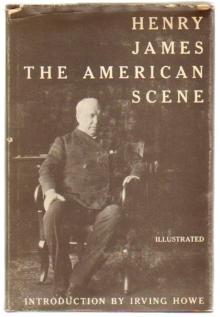 The American
The American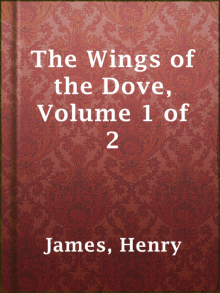 The Wings of the Dove, Volume 1 of 2
The Wings of the Dove, Volume 1 of 2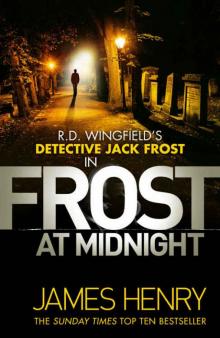 Frost at Midnight
Frost at Midnight Morning Frost
Morning Frost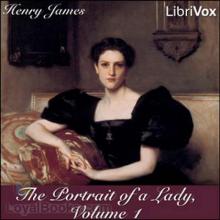 The Portrait of a Lady — Volume 1
The Portrait of a Lady — Volume 1 Fatal Frost
Fatal Frost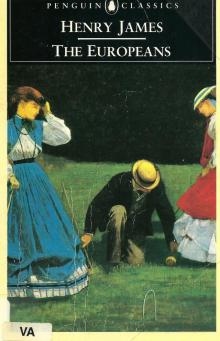 The Europeans
The Europeans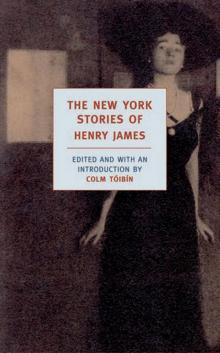 The New York Stories of Henry James
The New York Stories of Henry James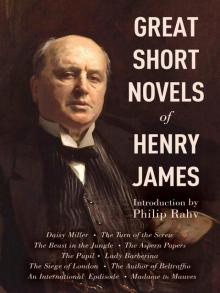 Great Short Novels of Henry James
Great Short Novels of Henry James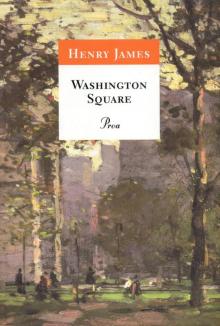 Washington Square
Washington Square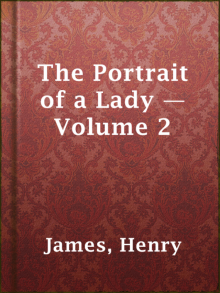 The Portrait of a Lady — Volume 2
The Portrait of a Lady — Volume 2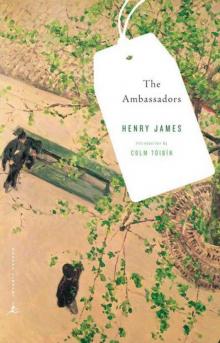 The Ambassadors
The Ambassadors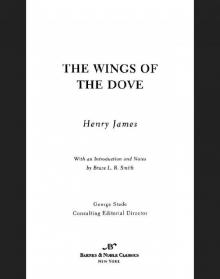 The Wings of the Dove
The Wings of the Dove The Princess Casamassima (Classics)
The Princess Casamassima (Classics)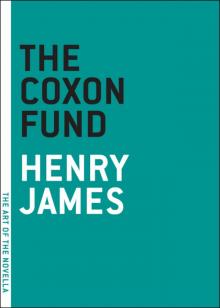 The Coxon Fund
The Coxon Fund First Frost
First Frost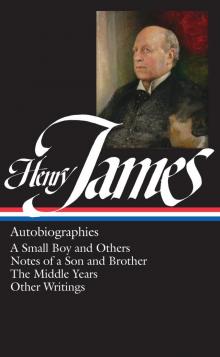 Henry James
Henry James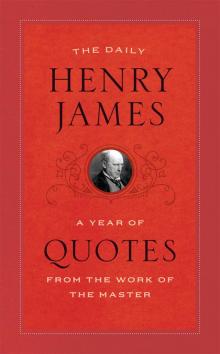 The Daily Henry James
The Daily Henry James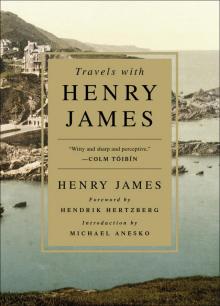 Travels With Henry James
Travels With Henry James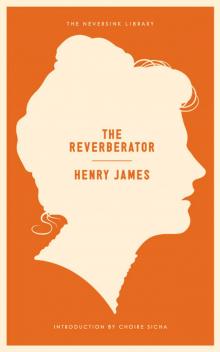 The Reverberator: A Novel
The Reverberator: A Novel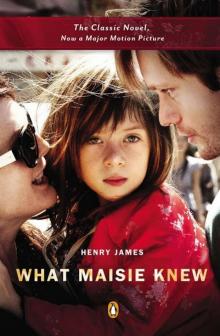 What Maisie Knew (Henry James Collection)
What Maisie Knew (Henry James Collection)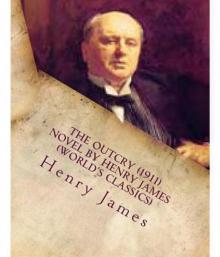 The Outcry
The Outcry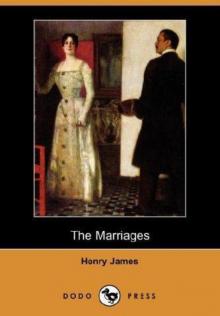 The Marriages
The Marriages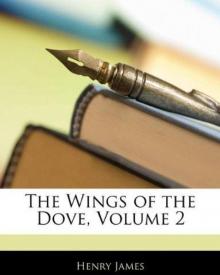 The Wings of the Dove, Volume 2
The Wings of the Dove, Volume 2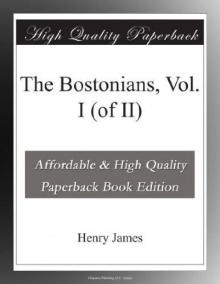 The Bostonians, Vol. I
The Bostonians, Vol. I The Outcry: -1911
The Outcry: -1911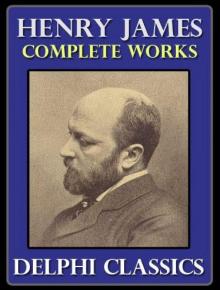 The Complete Works of Henry James
The Complete Works of Henry James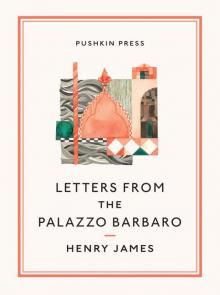 Letters from the Palazzo Barbaro
Letters from the Palazzo Barbaro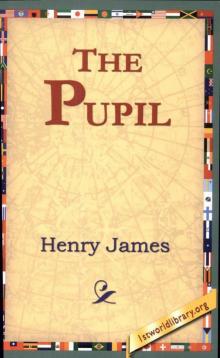 The Pupil
The Pupil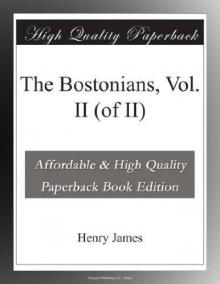 The Bostonians, Vol. II
The Bostonians, Vol. II Pandora
Pandora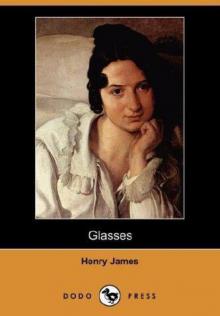 Glasses
Glasses The Princess Casamassima
The Princess Casamassima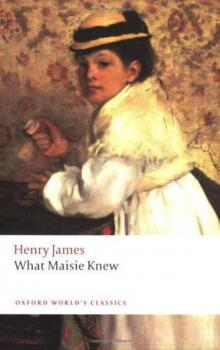 What Maisie Knew
What Maisie Knew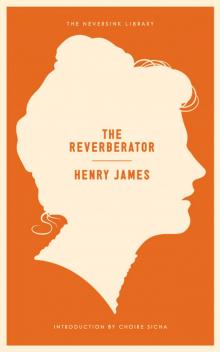 The Reverberator
The Reverberator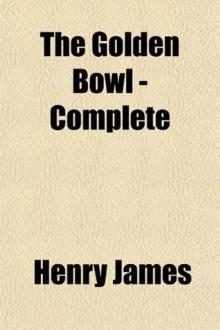 The Golden Bowl - Complete
The Golden Bowl - Complete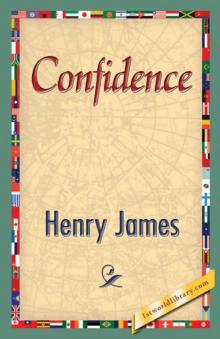 Confidence
Confidence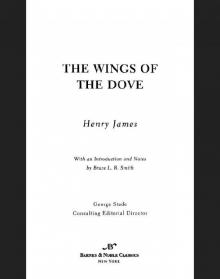 Wings of the Dove (Barnes & Noble Classics Series)
Wings of the Dove (Barnes & Noble Classics Series)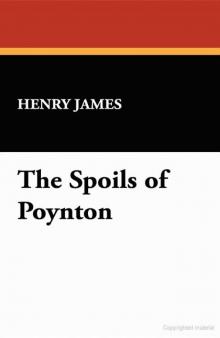 The Spoils of Poynton
The Spoils of Poynton